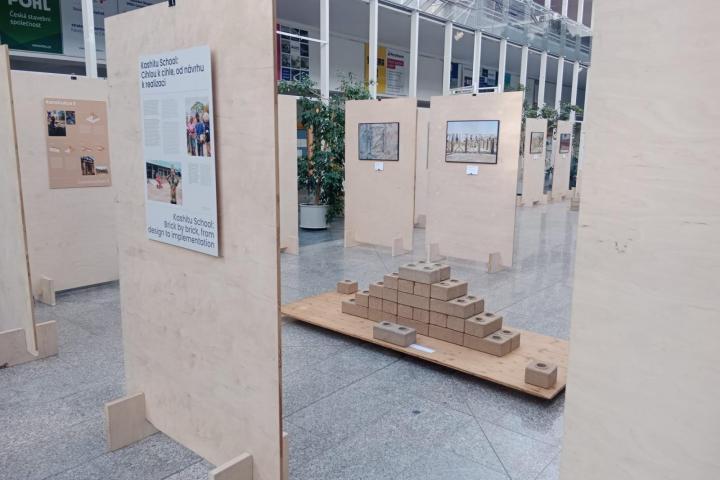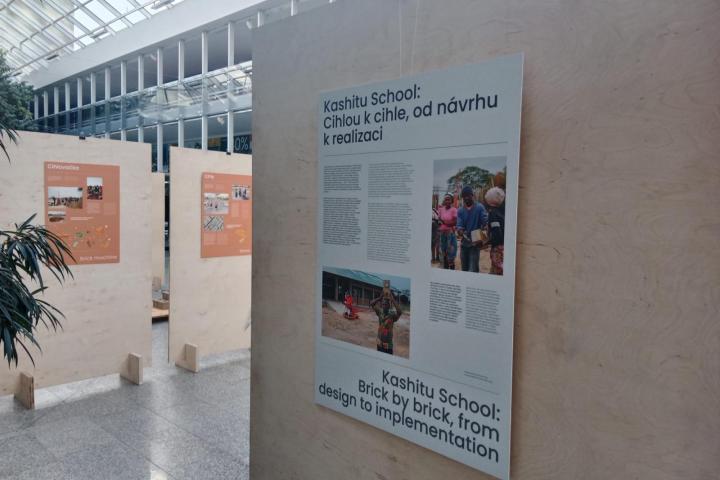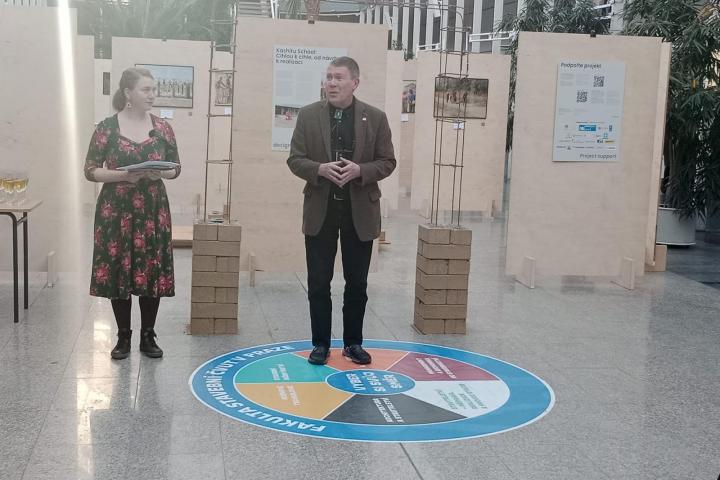
The exhibition presents the several-year journey from the initial idea to the completion of the building. Large-scale photographs are on display, models, as well as installations of real-life objects used on site in Zambia. The building was constructed with the cooperation of the Czech non-profit organization Friends of New Renato and the local non-profit New Renato Community Society, which is a major driver of development in this rural region and itself runs two primary schools and two kindergartens. The representative of the Ministry of Foreign Affairs, Hana Volná also attended the opening, as the Ministry provided financial support to the project together with UNDP in the form of the UNDP Challenge Fund. The Rector of CTU Vojtěch Petráček then supported the project by signing the grant.
The overall construction solution is adapted to the local climate - the technology of building structures from unfired pressed bricks follows the local tradition, but at the same time tries to address its shortcomings. Petr Čanda explains: "The options for quality technology for infrastructure and residential construction in rural Zambia are severely limited. Burnt bricks cause deforestation, concrete bricks are very costly. We decided to follow the traditional construction technology of making adobe bricks using a hand press, which we have improved. The brick making mix contains a very small admixture of cement, around 5%, and we make the bricks using quality machines made in the Czech Republic. This gives the bricks greater strength, makes them resistant to moisture and termites, and the machines we provide produce dimensionally stable bricks with interlocking function, making the construction process more efficient and easier."
"I was delighted when CTU received a grant from the United Nations Development Programme (UNDP) Challenge Fund, thanks to which it was able to proceed from preparation to construction. The main reason to be happy, however, is that CTU educates professionals who have excellent ideas that can be applied in the most needed areas of the world," said Vojtěch Petráček, Rector of CTU in Prague.
Over 40 volunteers from the Czech Republic and Zambia worked on the project. Students of Faculty of Civil Engineering and Faculty of Architecture were involved in the architectural and construction preparation in the form of school work. In the summer of 2023, the first building of the secondary school was created - a multi-purpose workshop where local craftsmen can apply their skills in the fields of locksmithing, beekeeping and carpentry. In addition to classrooms, laboratories and workshops, the boarding school campus also provides accommodation for students, teachers and international volunteers. The building also functions as a training centre for this new construction technology for the general public. Ten local volunteers who have been trained in this technology are now passing on their knowledge and experience.
The high school project is planned to continue this year. The CTU student team plans to build a model multi-purpose family house together with local workers, which will be constructed entirely with the help of this innovative material. Local people will thus build on their knowledge of brick production with training on how to use this building material to easily and independently build an entire house for their families. Not only will the newly built family house be used to increase the accommodation capacity of the future secondary school, but anyone interested in this technology will have the opportunity to see what such a house looks like and experience what it is like to live in it.
Secondary education in the Kashitu region of several thousand is only available to the wealthiest. The long commute and tuition fees prevent the vast majority of children from attending secondary school. Thus, they usually finish their education at the age of 13 and are involved in adult life. Low educational level is also linked to limited opportunities to develop their own businesses and thus the region as a whole. This situation is typical of most rural areas in Zambia.
The project was implemented in cooperation with the Centre for International Development Projects of CTU, the Czech organization Friends of New Renato and the Zambian non-profit New Renato Community Society. The group of volunteers (Kashitu team) that carried out the construction was formed at the first summer school of the Centre for International Development Projects of CTU.
---
About the Kashitu Secondary School Project
The Kashitu Secondary School responds to the problem of lack of access to secondary education for 3,000 pupils in 12 primary schools in the rural area of Kashitu. The nearest secondary school is 40 kilometres away. Part of the school is a practical school with apprenticeship courses (metalworking, carpentry, beekeeping), and part is a high school with a high school diploma (with the possibility to continue at university). The school is managed by the New Renato organisation, which was founded in 1986 on the initiative of local people and whose projects raise the standard of living of the 18 000 inhabitants in the Kashitu area. More information about the project: www.kashituschool.org
ICWD (International Center for World Development)
is a multidisciplinary platform for promoting education and interdisciplinary cooperation in the field of international development projects. The main objective of the Centre is to improve the quality of international humanitarian and development projects carried out by Czech organisations abroad and to link the cooperation of experts from different disciplines. The Centre seeks to broaden the opportunities for education of students and the public in the field of development cooperation and non-traditional technologies and the related expansion of their employment opportunities. In the long term, the Centre aims to create a study programme focused on the technical aspects of development projects (development engineering). www.icwd.cvut.cz

